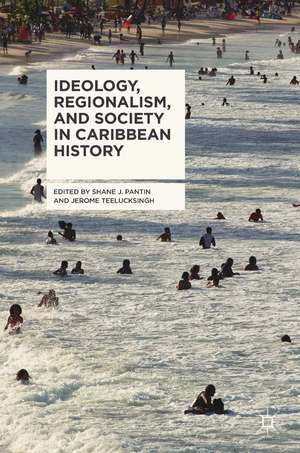Ideology, Regionalism, and Society in Caribbean History
Editat de Shane J. Pantin, Jerome Teelucksinghen Limba Engleză Hardback – 28 sep 2017
| Toate formatele și edițiile | Preț | Express |
|---|---|---|
| Paperback (1) | 630.76 lei 39-44 zile | |
| Springer International Publishing – 11 aug 2018 | 630.76 lei 39-44 zile | |
| Hardback (1) | 700.94 lei 6-8 săpt. | |
| Springer International Publishing – 28 sep 2017 | 700.94 lei 6-8 săpt. |
Preț: 700.94 lei
Preț vechi: 824.63 lei
-15% Nou
Puncte Express: 1051
Preț estimativ în valută:
134.13€ • 146.28$ • 113.10£
134.13€ • 146.28$ • 113.10£
Carte tipărită la comandă
Livrare economică 24 aprilie-08 mai
Preluare comenzi: 021 569.72.76
Specificații
ISBN-13: 9783319614175
ISBN-10: 3319614177
Pagini: 300
Ilustrații: XV, 300 p. 11 illus.
Dimensiuni: 148 x 210 x 23 mm
Greutate: 0.53 kg
Ediția:1st ed. 2017
Editura: Springer International Publishing
Colecția Palgrave Macmillan
Locul publicării:Cham, Switzerland
ISBN-10: 3319614177
Pagini: 300
Ilustrații: XV, 300 p. 11 illus.
Dimensiuni: 148 x 210 x 23 mm
Greutate: 0.53 kg
Ediția:1st ed. 2017
Editura: Springer International Publishing
Colecția Palgrave Macmillan
Locul publicării:Cham, Switzerland
Cuprins
1. Introduction.- I. The Mechanics of Regionalism.- 2. The Masses Speak: Popular Perspectives on the West Indian Federation.- 3. Promotion of the West Indies Federation: The Federal Information Service, 1957-1961.- 4. Regional Integration and the Problems of Caribbean and National History.- II. Ideology and Governance.- 5. "The most striking West Indian creation between the wars": C. L. R. James, the International African Service Bureau and Militant Pan-Africanism in Imperial Britain.- 6. New Beginning Movement: Coordinating Council of Revolutionary Alternatives for Trinidad and the Caribbean.- 7. Sir Rawson William Rawson: Governor of Barbaos, 1869–1875.- 8. Challenging a "Strategy of Imperialism": Chaguaramas and the Quest for American Security.- III. Caribbean Society: Cuisine and Culture.- 9. "We are what we eat": The Place of Food in the Caribbean.- 10. Carnival Celebrations in Trinidad and Tobago and Abroad: Cultural Diplomacy in Action/Practice.
Recenzii
“Ideology, Regionalism, and Society in Caribbean History is seminal in its multi-polar approach to understanding the historical, political and social dynamics that shape a region. … Editors Shane J. Pantin and Jerome Teelucksingh have presented an eclectic array of themes on the Caribbean ethos – a must read for students and policy makers. No doubt, they invite additional discourse and research toward viable integration and self-determination.” (Dr. Glenville Ashby, Kaieteur News, kaieteurnewsonline.com, October, 2017)
Notă biografică
Shane J. Pantin is a graduate of the Department of History and the Faculty of Law at The University of the West Indies, St. Augustine, Trinidad and Tobago.
Jerome Teelucksingh is a Lecturer in the Department of History at The University of the West Indies, St. Augustine, Trinidad and Tobago.
Jerome Teelucksingh is a Lecturer in the Department of History at The University of the West Indies, St. Augustine, Trinidad and Tobago.
Textul de pe ultima copertă
This volume collects new angles and perspectives on issues shaping the development of the Caribbean. Bringing together essays on regional integration, identity, and culture and focusing on foundational personalities and institutions in the region, this book opens up new lines of inquiry on twentieth-century Caribbean history. Essays examine popular perspectives of the West Indies Federation; the intersections of ideology and governance through key figures such as C. L. R. James and Rawson William Rawson; the socioeconomic context of Caribbean foodways; and Carnival as a tool of cultural diplomacy. Integration is a critical theme throughout. Pointing to the region’s rich cultural and historical heritage, this book explores how Caribbean unification may provide a way forward for this patchwork of island territories facing the challenges of the twenty-first century.
Caracteristici
Offers new perspectives on issues in Caribbean history and development Crosses disciplinary boundaries, with essays across the social sciences and humanities Appeals to scholars of Caribbean history, politics, sociology, and development Includes supplementary material: sn.pub/extras
